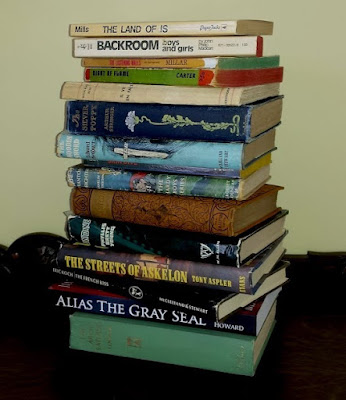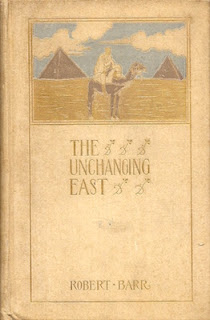Never has there been a year like this. I visited few used bookstores, ignored library book sales, spent no more than a couple of hours perusing online offerings, and yet somehow came up with the greatest haul of my fifty-something years.
The riches were so many and so great that the pristine copy of Wilson MacDonald's Out of the Wilderness pictured above was overshadowed. Fellow collectors will envy me for owning a scarce, unsigned copy – though it does bear the signature of previous owner Healey Willan. I'm assuming it came from the composer's library. It is now part of mine.
Because this has been such an extraordinary year, my annual ten best buys list has been expanded to twenty. As has been so often the case, I begin with Grant Allen:
An Army Doctor's
Romance
Grant Allen
London: Raphall Tuck &
Sons, [1893]
With A Terrible Inheritance, this ranks as one of the very worst Grant Allen books I've ever read. But, oh, isn't it attractive! After winning this copy in an online auction, I came upon a second. I'm offering it to the first person who expresses interest.
The Incidental Bishop
Grant Allen
New York: Appleton, 1898
If the opinion of Allen biographer Peter Morton is anything to go by – and it is – this novel of a young Canadian caught up in the slave trade will disappoint. The Incidental Bishop is longer than An Army Doctor's Romance, and is considerably less attractive, but I won't let that dissuade me from giving it a try.
Heart Songs
Jean Blewett
Toronto: Morag, 1898
The first of the poet's four volumes of verse, this second edition is inscribed. Blewett's verse has featured on this blog many times ( 'Queen Victoria', 'Easter Dawn', 'Thanksgiving Song', 'Thanksgiving Prayer'). This collection promises further riches.
A Strange Manuscript
Found in a Copper
Cylinder
James de Mille
New York: Harper &
Bros, 1888
A "lost civilization" novel read thirty-six years ago in my very first Canadian literature course. Does the fact that I've read nothing more by its author mean anything?
The Wooing of
Wistaria
Onoto Watanna
[Winnifred Eaton]
New York: Harper &
Bros, 1902
Eaton's third novel, penned in the early days of her ill-fated first marriage to Bertand Babcock. Academics suggest that he helped in its composition. They're probably right, which is not to say she wasn't better off without him.
The Heart of Hyacinth
Onoto Watanna
[Winnifred Eaton]
New York: Harper &
Bros, 1904
My obsession with the Eatons continues. They were the most remarkable and unusual family in Victorian Montreal. I fear my soul will not rest until someone writes a proper account of their trials and accomplishments.
Waste No Tears
Javis Warwick
[Hugh Garner]
Toronto: News Stand
Library, 1949
The Governor General's Award-winning writer's "novel about the Abortion Racket." Five years ago I helped return Waste No Tears to print as part of the Ricochet series, but had ever so much as seen a copy of the scarce News Stand Library edition.
Les songes en équilibre
Anne Hébert
Westmount, QC: Éditions
de l'arbre, 1942
Anne Hebert's first book, this copy is inscribed by her loving father, poet and literary critic Maurice Hébert:
À mes chers amis Monsieur et Madam Bandwell, ce livre d'une petite canadienne que j'aime beaucoup.
Le temps des hommes
André Langevin
Montreal: Le Cercle du
livre du France, 1956
Poussière sur la ville and Une Chaîne dans le parc are two of the best novels I've ever read. They're also the only two Langevin novels that are available in translation. I'm looking forward to tackling this one. Signed by the author.
Shackles
Marge Macbeth
New York: Henry
Waterson, 1927
The fourth novel by the Ottawa writer whose scandalous roman à clef The Land of Afternoon (1927) so entertained five years ago. The main character in this one is a writer!
The Poems and Essays
of John J. MacDonald
John J. MacDonald
Ottawa: Ru-Mi-Lou,
1928
Better known as "James MacRae," youngest of the Four Jameses, my interest in this poet began when we moved to St Marys, Ontario, in which he twice lived. I spent more than a decade hunting for a book – any book – by the man. This year, I found one.
Beast in View
Margaret Millar
London: Gollancz, 1955
The first UK edition of the novel for which Millar won the 1956 Edgar Award. James Bridges' 1964 television adaptation is recommended; Robert Glass's 1986 perversion is not.
Queen Kong
James Moffat [James Moffatt]
London: Everest, 1977
A novelization of a movie I've found unwatchable. This was yet another money job from a man better remembered as the celebrated skinhead novelist "Richard Allen". Featuring eight glossy pages of stills!
Flora Lyndsay; Or,
Passages in an Eventful
Life
Mrs. Moodie
New York: De Witt &
Davenport, [1854]
Now seems a good time to confess that I've never read one of Mrs Moodie's novels. On the other had, I've read two or three essays on Flora Lyndsay. The novel features in my first book, Character Parts, as a result.
Frederick Niven
London: Collins: 1935
Forgotten Frederick Niven's twenty-first novel (I think). For the reason laid out here, chances are I'll never read this tragic story of an acclaimed portrait painter and his three lady loves. The book makes the list because I like the way it looks and remember the thrill of uncovering it in a dank antique store in rural Ontario .
Wacousta; or, The
Prophesy
John Richardson
Montreal: John Lovell,
1868
The fourth and earliest edition I own. Will 2020 be the year I finally read this novel of the War of 1812?
Probably not.
Hardscrabble; or, The
Fall of Chicago
Major Richardson
New York: Pollard &
Moss, 1888
A later edition of John Richardson's 1850 novel of the Siege of Fort Dearborn during the War of 1812. Though popular in its day – and for years thereafter – the work didn't save Richardson from death through malnutrition.
Margaret M. Robertson
London: Hodder &
Stoughton, 1883
The penultimate novel by the woman who gave us Christie Redfern's Troubles, the teariest work in all of Canadian literature. Robertson scholar Lorraine McMullen considers By a Way She Knew Not the author's very best novel. I'm betting she's right.
A Romance of Toronto
Mrs. Annie G. Savigny
Toronto: William Briggs,
1888
A Victorian novel "FOUNDED ON FACT" by a woman whose previous books include An Allegory on Gossip.
How could I resist!
Hamilton and Other Poems
William A. Stephens
Toronto: Rogers &
Thompson, 1840
Included here because it is now the oldest book of Canadian verse I own. In Anxious Allegiances: Legitimizing Identity in the Early Canadian Long Poem (McGill-Queen's, 1997), Dr C.D. Mazoff dismisses the "Hamilton" as "rather poorly written." Here's hoping he's wrong.
The Days of Their Youth
Alan Sullivan
New York: Century,
1928
One of several Sullivans purchased that had once been part of the man's personal library. This novel is particularly interesting in that it has a pencilled notation by the author. Some unknown hand went after it with an eraser, but I bet I can discover what it says.
Related posts:














































